Key takeaways:
- Experiential learning emphasizes active participation and reflection, enhancing understanding beyond theoretical knowledge.
- Personal reflections are crucial for transforming experiences into meaningful insights, bridging the gap between theory and practice.
- Challenges in reflective practices include emotional overwhelm, fear of vulnerability, and time constraints, which can hinder the learning process.
- Integrating reflections promotes a growth mindset, turning mistakes into learning opportunities and fostering deeper connections with the material.
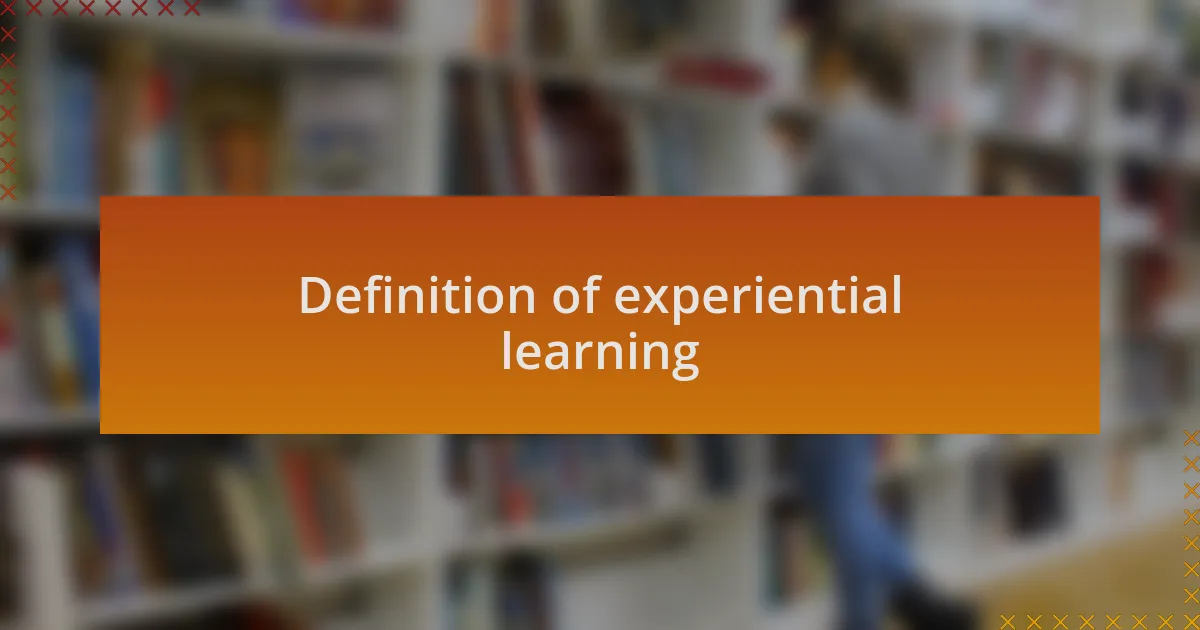
Definition of experiential learning
Experiential learning is fundamentally rooted in the idea that people learn best through experience. This approach emphasizes active participation rather than passive absorption of information, allowing learners to engage with the material in a tangible way. I often reflect on my own experiences in workshops where hands-on activities sparked a deeper understanding of concepts that seemed abstract in a lecture setting.
The definition of experiential learning also encompasses the reflective component. It’s not enough to simply do; one must think critically about the experience afterward. I recall a project where we built a prototype based on theoretical knowledge. The real breakthrough came when we reflected on our challenges during the process, leading to insights that textbooks alone could never provide. Isn’t it fascinating how the act of reflecting can transform a simple task into a profound learning opportunity?
Moreover, this learning style transforms the classroom into a dynamic environment. Imagine being in a setting where every lesson is connected to real-world scenarios. I vividly remember standing in front of a local community board, presenting solutions based on research conducted through direct interaction with community members. This experience cemented the idea for me that experiential learning turns knowledge into action, making it not just about understanding but also about applying concepts in a meaningful way.
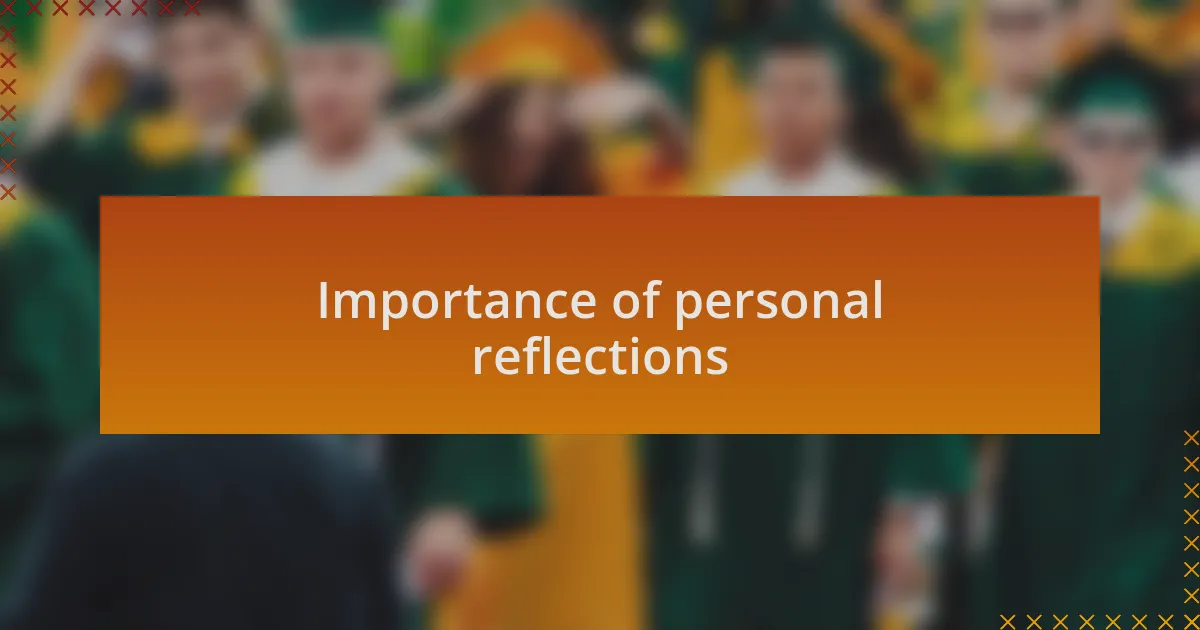
Importance of personal reflections
Personal reflections are vital in the experiential learning process because they propel us from mere participation to genuine understanding. I remember a time when I volunteered for a community service project; while I was physically engaged, it wasn’t until I sat down afterward and wrote about my feelings and observations that I started to grasp the impact of my contributions. Reflecting on this experience deepened my connection to the community and solidified my commitment to service.
I often find that personal reflections help in processing conflicting feelings that arise during learning experiences. A few years ago, I attended a challenging workshop where I felt out of my depth at first. It was only through taking the time to think about why I felt that way and how I could approach the topics differently that I turned a moment of self-doubt into a source of motivation. Isn’t it incredible how a little introspection can transform uncertainty into growth?
Moreover, personal reflections serve as a bridge between theory and practice. I once participated in a business simulation where I had to make quick decisions based on market trends. After the simulation, I took a moment to reflect on my choices and the outcomes. By considering what went right and what didn’t, I was able to draw connections to real-world business strategies, enhancing my comprehension significantly. This realization made me appreciate that without reflection, I’d be missing out on valuable lessons that could inform my future decisions.
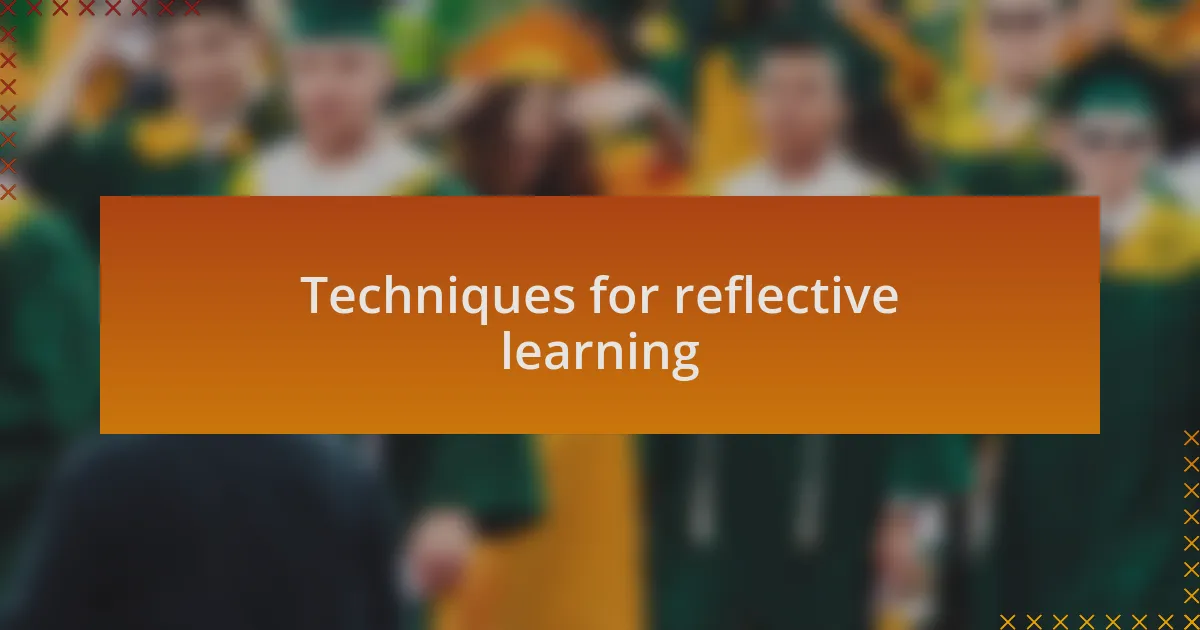
Techniques for reflective learning
One effective technique for reflective learning is maintaining a learning journal. I’ve found that jotting down my thoughts immediately after an experience helps me capture raw emotions and insights. Once, after a leadership retreat, I scribbled feelings of excitement alongside doubts about my abilities. Revisiting those entries later transformed my understanding of my leadership style and highlighted my areas for growth.
Another powerful method is engaging in peer discussions. Sharing experiences with others often brings new perspectives that I might have missed on my own. I vividly recall a group debrief after a challenging team project where my peers shared their insights. Listening to their reflections not only validated my feelings but also introduced me to alternative strategies I hadn’t considered. Doesn’t it strike you that conversations can pave the way for deeper understanding?
Finally, utilizing structured frameworks for reflection can add clarity to the process. I often refer to Gibbs’ Reflective Cycle, which encourages me to explore a situation from various angles: what happened, what I felt, and what I would do differently next time. During my most recent training session, applying this framework allowed me to dissect my reactions and identify actionable steps for future improvements. How often do we miss the opportunities for growth because we don’t take the time to analyze our experiences thoughtfully?
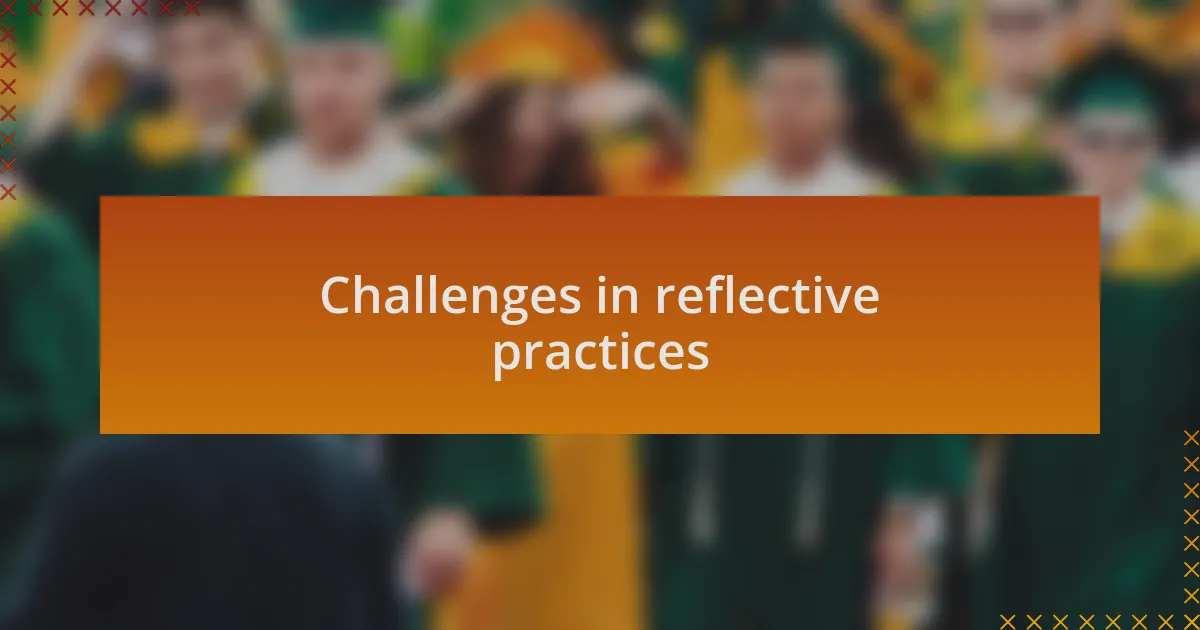
Challenges in reflective practices
Reflective practices come with their own set of challenges that can sometimes feel daunting. I remember a time when I set out to reflect on a particularly stressful project. The intensity of my emotions overshadowed my ability to think critically, and instead of gaining insight, I found myself spiraling into frustration. Have you ever felt that way? It’s in those moments when our emotions can make the reflective process seem overwhelming.
Another significant hurdle is the fear of vulnerability. I’ve often hesitated to share my reflections with peers, worrying they might judge my experiences or opinions. For instance, during a workshop on feedback, I kept my thoughts to myself, fearing criticism. I soon realized that this fear stifled my growth and limited the rich conversations that could have emerged. What if, instead, we embraced that vulnerability as a pathway to deeper connections and learning?
Finally, time constraints can derail our reflective practices. I’ve often rushed through my reflections in the heat of a busy week, skimming over key insights that deserved more attention. I’ve learned that carving out dedicated time for reflection is crucial. So I ask, how often do we prioritize reflection amid our packed schedules? By committing to this practice, we can uncover profound insights that enrich our learning journeys.
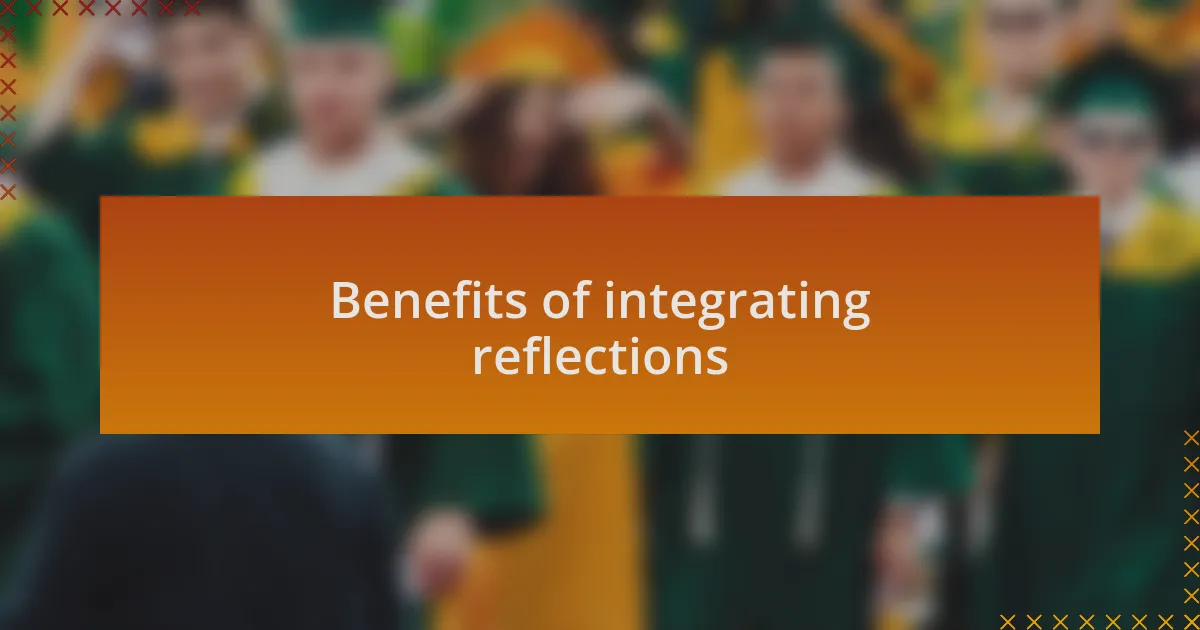
Benefits of integrating reflections
Integrating reflections into our learning processes can significantly enhance our understanding and retention of new concepts. I recall a moment in a group project where we took the time to reflect on our collaboration. This pause allowed us to recognize our strengths and pinpoint areas for improvement, ultimately elevating our teamwork in subsequent projects. Have you ever experienced that “aha!” moment after taking a step back to think about your process?
Additionally, the act of reflecting offers a chance to connect personal experiences with theoretical learning. I once took a course where the instructor encouraged us to journal about our feelings and thoughts on course material. As I wrote, I began to relate theories to situations in my own life, which not only deepened my comprehension but also made the learning more meaningful. Isn’t it fascinating how personal insights can turn abstract concepts into relatable experiences?
Lastly, integrating reflections fosters a growth mindset. When I embraced my mistakes as learning opportunities during reflective exercises, I noticed a shift in my attitude toward challenges. Rather than feeling defeated, I began to approach new tasks with curiosity and resilience. Isn’t it empowering to know that every setback can pave the way for future growth? Embracing this mindset through reflection makes learning an ongoing journey filled with possibilities.
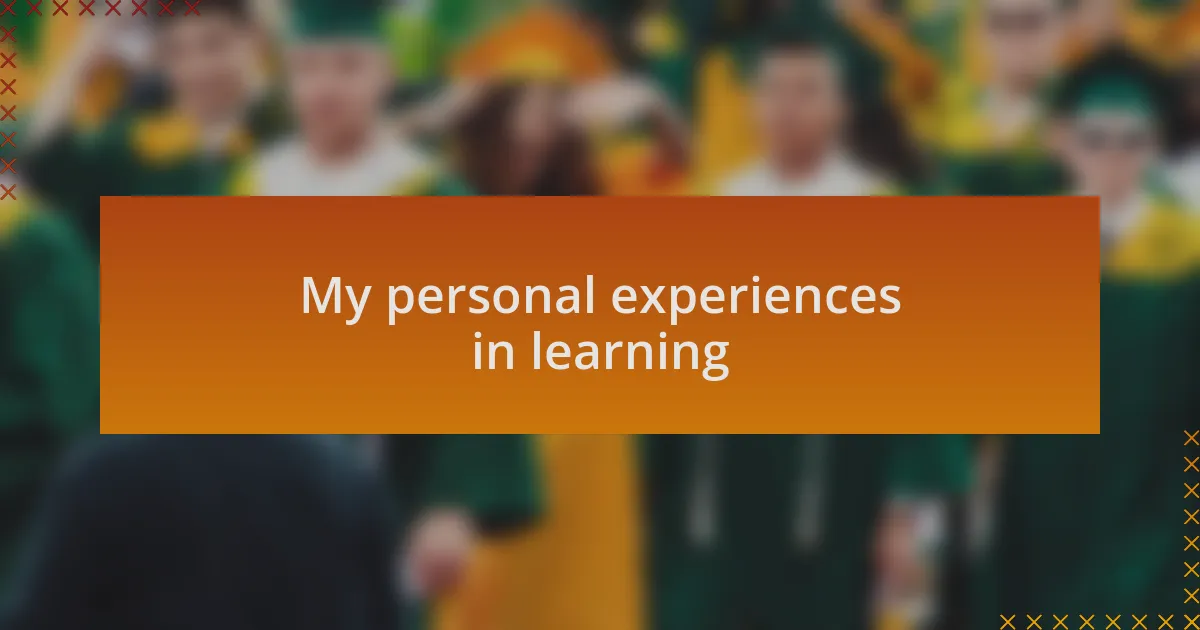
My personal experiences in learning
Thinking back on my educational journey, one experience stands out vividly. During a particularly challenging math class, our teacher encouraged us to reflect on our problem-solving approaches. I remember feeling a mix of frustration and curiosity as I wrote about my thought process. This reflection helped me identify not just the errors in my calculations, but also the gaps in my understanding. Have you ever realized that acknowledging where you struggle can lead to a breakthrough?
I also recall a moment in a literature class where we were asked to share our personal connections to the texts we were reading. When I shared a story from my own life that mirrored the themes of the novel, I felt a sense of connection with my classmates. It was as if we were weaving our individual experiences into a collective understanding of the material. Can you imagine how much richer our learning becomes when we infuse it with our personal narratives?
Reflecting on my learning experiences has transformed my relationship with education. I once feared public speaking, which made me dread presentations. However, after reflecting on my past successes and failures, I began to embrace those moments as opportunities to share my voice. Isn’t it incredible how a little introspection can shift our perspective and instill confidence? This change catalyzed my growth and opened new doors in my academic life.
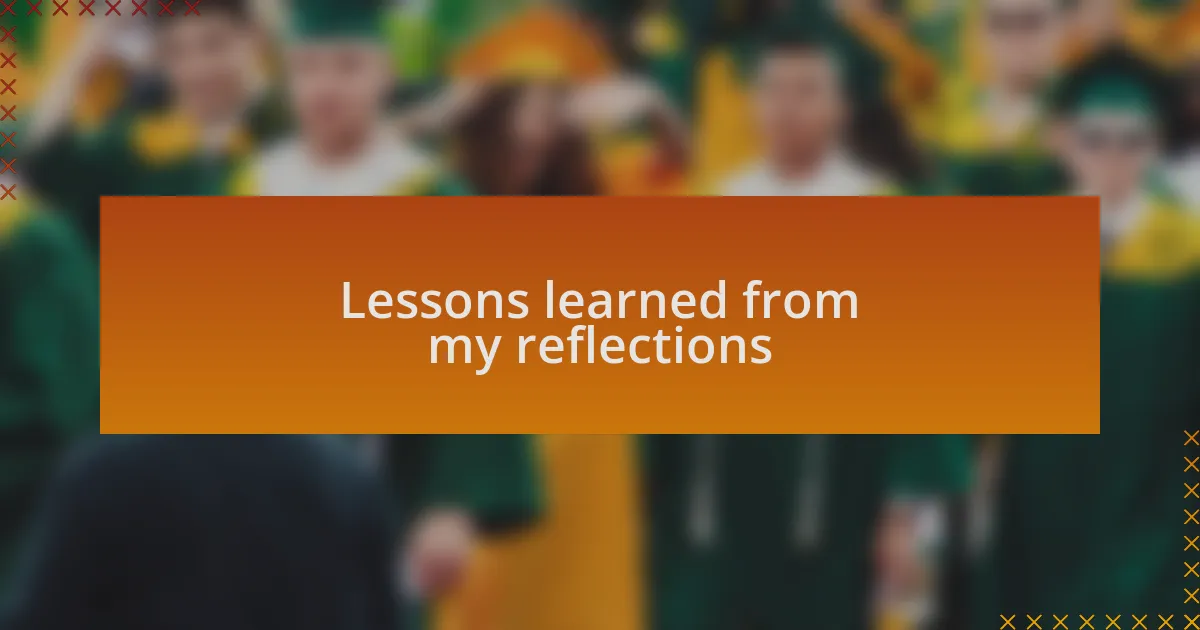
Lessons learned from my reflections
Engaging in reflection has taught me the value of vulnerability in learning. I recall a time when I hesitated to ask questions in class, for fear of sounding uninformed. Through reflection, I learned that asking questions not only clarifies my understanding but also fosters a learning environment where others feel empowered to do the same. Isn’t it fascinating how our hesitations can create barriers to collective growth?
One particularly enlightening moment came when I reflected on a group project that didn’t go as planned. I was frustrated with the outcome, but upon deeper reflection, I realized I had not communicated my ideas effectively. This admission was uncomfortable, yet it paved the way for me to improve my collaboration skills. How often do we overlook our role in shared successes and failures?
Through my reflections, I’ve discovered the transformative power of gratitude in learning experiences. I started keeping a journal where I pen down lessons learned after each class. It has been eye-opening to see how expressing gratitude for learning opportunities, even the tough ones, shifts my mindset towards positivity. Have you ever tried this approach? It has undoubtedly deepened my appreciation for the learning journey.